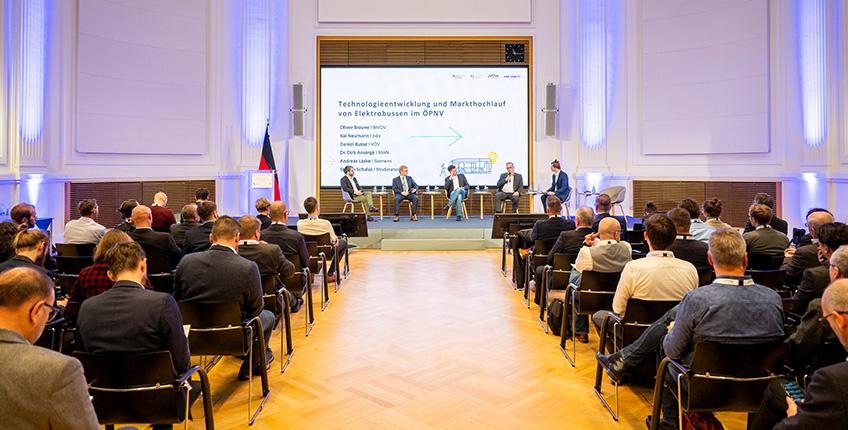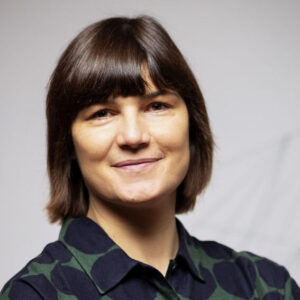For 10 years, the “Innovative Drives Bus” working group (AG Bus – Innovative Antriebe Bus Arbeitsgruppe) has been a place where transport companies, politicians, scientists and manufacturers of vehicles and components have been discussing the transformation to climate-friendly public transport. Identifying challenges, developing solutions: which was also the topic of this year’s meeting.
Initiated by the Federal Ministry for Digital and Transport (BMDV – Bundesministerium für Digitales und Verkehr) and the Federal Ministry for Economic Affairs and Climate Protection (BMWK – Bundesministerium für Wirtschaft und Klimaschutz), the “Innovative Bus Drives” working group (AG Bus) has been a forum for transport companies and research projects, manufacturers, suppliers and politicians to directly exchange information and experiences since 2013.
The 2023 annual meeting held on 23 November commenced with words of welcome from the hosts, Berthold Goeke from BMWK and Johannes Wieczorek from the BMDV, followed by a presentation by colleagues from NOW GmbH and VDI/VDE-IT on current figures and developments in the bus funding programmes as well as findings from the accompanying programmes:
- The funding support for electric buses by the BMWK has already put over 1,400 buses on the roads. The majority of the projects will be successfully completed in 2023. A closing event, at which the results of the accompanying study will be presented, is planned for June 2024.
- With the approvals to date, the BMDV’s bus funding guideline will make a significant contribution to the further market ramp-up of climate-friendly buses. The range of corresponding vehicles on the market is growing steadily.
- There are currently over 2,500 electric buses in Germany, with more than 25 manufacturers offering a variety of over 100 different models in the zero-emission bus sector.
In a panel discussion, Oliver Braune (BMDV), Kai Neumann (bdo), Daniel Busse (VDV) and Andreas Laske (Siemens) spoke about the status quo of alternative drive systems in public transport and technological developments.
The second part of the day was dedicated to municipal and private transport companies, which reported on their practical experience with battery-electric buses. KVG from Kiel, Eichberger Reisen from Passau and Hülsmann Reisen from Voltlage in Lower Saxony presented the current implementation status of their subsidised projects. Mr Julian Brendel from the Reiner Lemoine Institute (RLI) gave an introduction to the planning and optimisation of charging infrastructure.
About the BMDV and BMWK funding for buses with alternative drive systems
To increase the transport sector’s contribution to climate protection, the German government has set itself the goal of utilising the potential of public transport and converting 50 percent of city buses to electric drives by 2030. To achieve this, suitable funding programmes have been established in recent years. The BMDV’s guideline for the promotion of alternative drive systems for buses in passenger transport supports transport companies in the procurement of buses with alternative drive systems and in the preparation of feasibility studies. Funding for this measure is also provided as part of the German Recovery and Resilience Plan (DARP – Deutscher Aufbau- und Resilienzplan) via the European Recovery and Resilience Facilities (ARF – Aufbau- und Resilienzfazilitäten). Several calls for funding for the procurement of vehicles and infrastructure as well as for the preparation of feasibility studies are currently supporting around 230 transport companies with over 4,000 buses and an estimated funding volume of over 1.3 billion euros. The BMDV has been funding battery and fuel cell electric activities in passenger transport since 2010. The BMDV’s bus and electric mobility funding guidelines are coordinated by NOW GmbH and implemented by Project Management Jülich (PtJ).
The BMWK promotes the conversion of bus fleets to battery-electric vehicles as part of the guideline for the procurement of electric buses in public transport. In addition to climate protection, air pollution control and noise protection are further concerns of the funding programme. Since 2018, a total of 50 projects have been approved in over 60 cities and regions, with a total funding volume of around 522 million euros. The projects are implemented by VDI/VDE Innovation + Technik GmbH.


